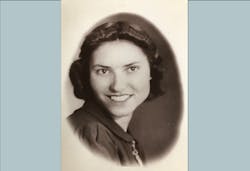Remembering a Real-Life ‘Rosie the Riveter’ on Mother’s Day
Growing up, I never heard any mention of my Granny working outside the home. I assumed that she was a housewife helping Grandpa tend to the children and the farm. It wasn’t until her funeral that I learned she worked in not one but three textile mills in Tennessee during World War II.
Granny was a Rosie the Riveter. Rosie is a symbol of all women working in the war industries during World War II.
Since I never heard the story firsthand, I asked my mother to recount what she remembered. I found leadership lessons in Granny’s story.
Women in Tennessee Textile Factories
“The sock mill in Philadelphia might have been the first mill my mother worked in. We remember her telling us that she lived in a boarding house in Philadelphia. When winter came, the house had insufficient heat. So, she wrote home and told her mother she was cold. Her mother promptly got Jerome [Granny’s father] to drive her to Philadelphia. She scolded the owner of the boarding house, telling her she was there to pick up her daughter because she wasn't going to let her daughter be cold.”
Lesson Learned: Have a network of people who will support you whether life is cold or hot.
“Mother then started sharing rides with two other ladies from Niota, one of which became a very good friend. Many funny stories were told of things happening on the trip to and from Philadelphia. One day Mother was driving in snow trying to get them back to Niota [Tennessee]. One of the riders was hollering from the backseat, “We are going to wreck on the slippery road.” Mother finally said, “If you will just be quiet, I will get us home.” And she did.”
Lesson Learned: Grit (determination and persistence) will help you through tough situations.
“Athens Hosiery Mill made Buster Brown socks. Later in life, when Mother had children, she always bought Buster Brown socks and shoes. About a week before she was to visit Daddy in Norfolk, Virginia, or Havre de Grace, Maryland, [he was working on a naval supply ship], she told her supervisor she was going to visit her husband. We all know the name of the man because Mother never forgot what he told her. The supervisor said, “If you go, you won’t have a job when you come back.” Mother said, “Okay, but I am going.” And she did. She lost her job but turned around and got one at another textile mill.
Lesson Learned: You must follow your heart or core values even if it means losing your job.
“Toward the end of the war, Mother was working at the Judith Hosiery Mill. When Daddy returned from war in December of 1945, he went to work there also. Mother worked on the machine that sewed the toe of the sock to the top of the sock. Today, it is all knitted together with no seams. I also remember that she inspected the finished socks to make sure there were no dropped stitches or holes. Mother had her first child, a daughter, in September of 1946 and never worked outside the home after that.”
Lesson Learned: Never judge a book by its cover.
For me, this is the biggest lesson in Granny’s story. My memories of her include delicious fried apple hand pies and amazing deviled eggs. I never knew that her early-life years were full of hard work in support of the war effort. I wish that I had known in time to ask her the stories myself as I am sure they would have been hilarious told from her viewpoint. I am grateful that my mother heard them and shared them with us all.
Reflection: What stories might your mother share with you this Mother’s Day?
Main Photo: Walters' grandmother, Myrtle Lee Roberts
